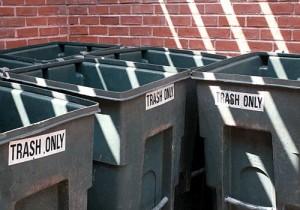
Image Contributor
New trash disposal procedures have been implemented for students living in on-campus apartments and townhouses.
With stricter procedures for the disposal of trash and recycling, new university policy is forcing students to clean up their acts.
In an Aug. 13 e-mail sent to students living in on-campus apartments and townhouses, residents were informed that the university had altered the rules regarding the disposal of trash. The new policy states that there will be consequences for: “a) failure to place trash in appropriate trash receptacle(s); b) leaving trash receptacle(s) on public display outside of apartment, townhouse, room, etc., in excess of the posted allotted timeframe; c) accumulation of trash in rooms, apartment, front and/or backyard that could cause a health risk,” according to the e-mail.
Director of Residence Life Stephanie Lynch said she expects the benefits of the new policy to extend beyond campus.
“Our hope is that clarification of the trash policy and new trash disposal locations will help both the students and the neighbors,” she said. “Trash disposal and recycling will be more convenient for our townhouses on Prospect Street and the 1400 block of 36th Street since [residents] will be able to take their trash out at any time,” she said.
The e-mail to students called for special attention to trash during the move-in process, during which more dumpsters would be provided to accommodate a higher volume of garbage from packing materials.
The trash policy will be enforced by university staff members who will periodically check conditions near student residences. The penalty for a violation is serious, ranging from a $50 fine per resident and five work sanction hours per resident to a $150 fine per resident and an apartment living suspension for a third-time offense.
Henle Village resident Katie Pak (COL ’12) said she was not surprised by the severity of the punishment for a trash policy violation.
“I think the strictness is well-intentioned: Obviously we want people to be responsible for their trash and keep the area clean, but I doubt that many people are going to follow through with the policy, and it just seems difficult to enforce,” Pak said. “It would make it easier if trash wasn’t in one centralized location, because the more people have to travel to get to the dumping site, the less responsible people are going to be about the policy,” she added.
Rodents were a particular source of concern for the university when creating the new policy, Lynch said. “We believe these efforts should assist in rodent control in the neighborhood and around campus,” she said.
Students were also provided with tips to make trash disposal as easy as possible. They were reminded not to use trash bags larger than 13 gallons, for example, because these are too large to fit down the trash chute. These bags should be plastic, tied tightly when full and disposed of quickly. “







